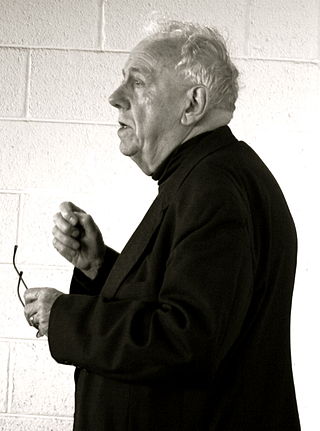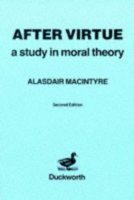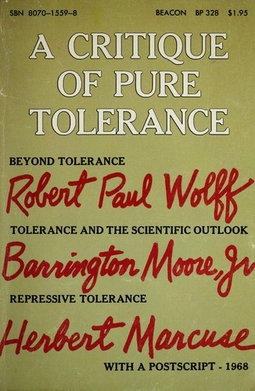Related Research Articles

Teleology or finality is a branch of causality giving the reason or an explanation for something as a function of its end, its purpose, or its goal, as opposed to as a function of its cause. James Wood, in his Nuttall Encyclpaedia, explained the meaning of teleology as "the doctrine of final causes, particularly the argument for the being and character of God from the being and character of His works; that the end reveals His purpose from the beginning, the end being regarded as the thought of God at the beginning, or the universe viewed as the realisation of Him and His eternal purpose."

Virtue ethics is an approach that treats virtue and character as the primary subjects of ethics, in contrast to other ethical systems that put consequences of voluntary acts, principles or rules of conduct, or obedience to divine authority in the primary role.

Charles Margrave Taylor is a Canadian philosopher from Montreal, Quebec, and professor emeritus at McGill University best known for his contributions to political philosophy, the philosophy of social science, the history of philosophy, and intellectual history. His work has earned him the Kyoto Prize, the Templeton Prize, the Berggruen Prize for Philosophy, and the John W. Kluge Prize.

Aristotelianism is a philosophical tradition inspired by the work of Aristotle, usually characterized by deductive logic and an analytic inductive method in the study of natural philosophy and metaphysics. It covers the treatment of the social sciences under a system of natural law. It answers why-questions by a scheme of four causes, including purpose or teleology, and emphasizes virtue ethics. Aristotle and his school wrote tractates on physics, biology, metaphysics, logic, ethics, aesthetics, poetry, theatre, music, rhetoric, psychology, linguistics, economics, politics, and government. Any school of thought that takes one of Aristotle's distinctive positions as its starting point can be considered "Aristotelian" in the widest sense. This means that different Aristotelian theories may not have much in common as far as their actual content is concerned besides their shared reference to Aristotle.

The is–ought problem, as articulated by the Scottish philosopher and historian David Hume, arises when one makes claims about what ought to be that are based solely on statements about what is. Hume found that there seems to be a significant difference between positive statements and prescriptive or normative statements, and that it is not obvious how one can coherently transition from descriptive statements to prescriptive ones. Hume's law or Hume's guillotine is the thesis that an ethical or judgmental conclusion cannot be inferred from purely descriptive factual statements.

Analytical Thomism is a philosophical movement which promotes the interchange of ideas between the thought of Thomas Aquinas, and modern analytic philosophy.
Critique is a method of disciplined, systematic study of a written or oral discourse. Although critique is commonly understood as fault finding and negative judgment, it can also involve merit recognition, and in the philosophical tradition it also means a methodical practice of doubt. The contemporary sense of critique has been largely influenced by the Enlightenment critique of prejudice and authority, which championed the emancipation and autonomy from religious and political authorities.

Alasdair Chalmers MacIntyre is a Scottish-American philosopher who has contributed to moral and political philosophy as well as history of philosophy and theology. MacIntyre's After Virtue (1981) is one of the most important works of Anglophone moral and political philosophy in the 20th century. He is senior research fellow at the Centre for Contemporary Aristotelian Studies in Ethics and Politics (CASEP) at London Metropolitan University, emeritus Professor of Philosophy at the University of Notre Dame, and permanent senior distinguished research fellow at the Notre Dame Center for Ethics and Culture. During his lengthy academic career, he also taught at Brandeis University, Duke University, Vanderbilt University, and Boston University.
Phronesis is a type of wisdom or intelligence concerned with practical action. It implies both good judgment and excellence of character and habits, and was a common topic of discussion in ancient Greek philosophy. Classical works about this topic are still influential today. In Aristotelian ethics, the concept was distinguished from other words for wisdom and intellectual virtues—such as episteme and sophia—because of its practical character. The traditional Latin translation is prudentia, which is the source of the English word "prudence".

Tsang Lap Chuen is a Chinese philosopher in the analytic tradition. He is known for his theory of the sublime in which he presents the notion of limit-situations in life as being central to the human experience.

After Virtue: A Study in Moral Theory is a book on moral philosophy by the Scottish philosopher Alasdair MacIntyre. MacIntyre provides a bleak view of the state of modern moral discourse, regarding it as failing to be rational, and failing to admit to being irrational. He claims that older forms of moral discourse were in better shape, particularly singling out Aristotle's moral philosophy as an exemplar. After Virtue is among the most important texts in the recent revival of virtue ethics.

John Niemeyer Findlay, usually cited as J. N. Findlay, was a South African philosopher.

Alfred Edward Taylor, usually cited as A. E. Taylor, was a British idealist philosopher most famous for his contributions to the philosophy of idealism in his writings on metaphysics, the philosophy of religion, moral philosophy, and the scholarship of Plato. He was a fellow of the British Academy (1911) and president of the Aristotelian Society from 1928 to 1929. At Oxford he was made an honorary fellow of New College in 1931. In an age of universal upheaval and strife, he was a notable defender of Idealism in the Anglophone world.
"Modern Moral Philosophy" is an article on moral philosophy by G. E. M. Anscombe, originally published in the journal Philosophy, vol. 33, no. 124.
Larry Arnhart is a Distinguished Research Professor Emeritus of Political Science at Northern Illinois University in DeKalb, Illinois. He lives in Grand Rapids, Michigan. Arnhart has been described as one of the most prominent advocates of contemporary classical liberalism, along with Milton Friedman, George Stigler, Friedrich Hayek and Thomas Sowell. His areas of teaching and research include the history of political philosophy, biopolitical theory, and American political thought. Arnhart is the author of five books and more than forty peer-reviewed articles.
Ethics is the branch of philosophy that examines right and wrong moral behavior, moral concepts and moral language. Ethics or moral philosophy is a branch of philosophy that "involves systematizing, defending, and recommending concepts of right and wrong behavior". The field of ethics, along with aesthetics, concerns matters of value, and thus comprises the branch of philosophy called axiology.
The philosophy of human rights attempts to examine the underlying basis of the concept of human rights and critically looks at its content and justification. Several theoretical approaches have been advanced to explain how and why the concept of human rights developed.

A Critique of Pure Tolerance is a 1965 book by the philosopher Robert Paul Wolff, the sociologist Barrington Moore Jr., and the philosopher Herbert Marcuse, in which the authors discuss the political role of tolerance.

Herbert Marcuse was a German–American philosopher, social critic, and political theorist, associated with the Frankfurt School of critical theory. Born in Berlin, Marcuse studied at the Humboldt University of Berlin and then at Freiburg, where he received his Ph.D. He was a prominent figure in the Frankfurt-based Institute for Social Research, which later became known as the Frankfurt School. In his written works, he criticized capitalism, modern technology, Soviet Communism, and popular culture, arguing that they represent new forms of social control.
References
- ↑ Skelton, Anthony. "William David Ross". In Zalta, Edward N. (ed.). Stanford Encyclopedia of Philosophy .